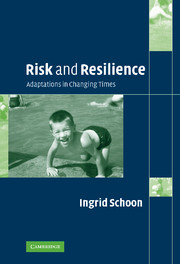Book contents
- Frontmatter
- Contents
- List of figures
- List of tables
- Foreword by Glen H. Elder, Jr
- Preface by John Bynner
- Acknowledgements
- Introduction
- 1 Risk and resilience: definitions
- 2 Towards a developmental-contextual systems model of adjustment
- 3 Persisting inequalities in times of social change
- 4 Selection, causation and cumulative risk effects
- 5 Protective factors and processes
- 6 Stability of early adjustment over time
- 7 Personal goals and life plans
- 8 Conclusions and outlook
- 9 Implications of findings for interventions and social policy
- Appendix A Two British birth cohorts
- Appendix B Response rates and handling of missing data
- Appendix C Description of variables used in the study
- References
- Index
4 - Selection, causation and cumulative risk effects
Published online by Cambridge University Press: 22 September 2009
- Frontmatter
- Contents
- List of figures
- List of tables
- Foreword by Glen H. Elder, Jr
- Preface by John Bynner
- Acknowledgements
- Introduction
- 1 Risk and resilience: definitions
- 2 Towards a developmental-contextual systems model of adjustment
- 3 Persisting inequalities in times of social change
- 4 Selection, causation and cumulative risk effects
- 5 Protective factors and processes
- 6 Stability of early adjustment over time
- 7 Personal goals and life plans
- 8 Conclusions and outlook
- 9 Implications of findings for interventions and social policy
- Appendix A Two British birth cohorts
- Appendix B Response rates and handling of missing data
- Appendix C Description of variables used in the study
- References
- Index
Summary
Time present and time past
Are both perhaps present in time future,
And time future contained in time past
T. S. Eliot, 1936The aim of this chapter is to investigate the long-term influence of socio-economic adversity on individual adjustment, taking into account the timing, duration and context in which the developing individual experiences adversity. The question of how individuals and environments are linked across the life course, i.e. the developmental-contextual systems perspective formulated in Chapter 2, will be re-cast in terms of a testable model of continuities in social disadvantage and individual adjustment and their reciprocal effects over time.
There is now consistent evidence that early and persistent experience of socio-economic disadvantage is a reliable predictor for the occurrence of adjustment problems in childhood and adulthood. Children growing up in socio-economically disadvantaged families are at an increased risk for a wide range of adverse outcomes including poor academic achievement and adjustment problems in later life, as reflected in own occupational attainment, social position and poor health (Bynner et al., 2000; Luthar, 1999; Rutter, 1998; Schoon et al., 2002; Schoon et al., 2003; Werner & Smith, 1982, 1992). The consequences of growing up in a disadvantaged family environment can continue into adulthood or even into the next generation (Birch & Gussow, 1970; Duncan & Brooks-Gunn, 1997; Garmezy, 1991; Rutter & Madge, 1976).
- Type
- Chapter
- Information
- Risk and ResilienceAdaptations in Changing Times, pp. 57 - 73Publisher: Cambridge University PressPrint publication year: 2006
- 1
- Cited by



